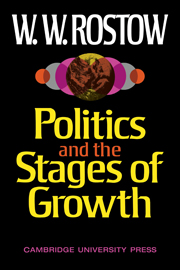Book contents
- Frontmatter
- Contents
- Tables
- PREFACE
- INTRODUCTION
- 1 A way of looking at politics
- 2 Politics in pre-Newtonian societies
- 3 The politics of the preconditions for take-off
- 4 The politics of the take-off and the drive to technological maturity
- 5 American politics: a not so special case
- 6 The politics of the search for quality
- 7 Politics and democracy in the contemporary developing world
- 8 War and peace in the global community
- APPENDIX: The views of others in relation to the approach taken here
- NOTES
- INDEX
5 - American politics: a not so special case
Published online by Cambridge University Press: 16 October 2009
- Frontmatter
- Contents
- Tables
- PREFACE
- INTRODUCTION
- 1 A way of looking at politics
- 2 Politics in pre-Newtonian societies
- 3 The politics of the preconditions for take-off
- 4 The politics of the take-off and the drive to technological maturity
- 5 American politics: a not so special case
- 6 The politics of the search for quality
- 7 Politics and democracy in the contemporary developing world
- 8 War and peace in the global community
- APPENDIX: The views of others in relation to the approach taken here
- NOTES
- INDEX
Summary
INTRODUCTION
Three Special Initial Conditions
American life was initially colored by three special characteristics which have left abiding marks on the political scene.
First, the sense of America's special meaning and moral responsibility. This arose from the counterpoint between values and institutions brought from Tudor England and the primitive setting of a continent rich in arable land and natural resources. Out of the terms inherent in the arrival of seventeenth-century English colonists on an almost empty continent, an American political life evolved which tended progressively towards self-government in the townships and counties, the primacy of the colonial legislatures, and, utlimately, the principle of one-man one-vote. This bent was heightened by the physical exigencies and opportunities of seventeenth-century North America, which permitted – even required – a high degree of individual freedom and individual enterprise.
With the passage of time this interplay between a peculiar political and economic environment yielded, in Tocqueville's phrase, the ‘magnificent image’ which ‘does not meet the gaze of the Americans at intervals only; it may be said to haunt every one of them in his least as well as in his most important actions and to be always flitting before his mind’. The converging visions of America as a place of unique human sanctuary, of unique material opportunity, and of transcendent democratic mission are the basis for what Gunnar Myrdal once described as the nation's ‘moral overstrain’ and for Sartre's observation on Americanism: ‘Americanism is not merely a myth that clever propaganda stuffs into people's heads but something every American continually reinvents in his gropings. It is at one and the same time a great external reality rising up at the entrance to the port of New York across from the Statue of Liberty and the daily product of anxious liberties.’
- Type
- Chapter
- Information
- Politics and the Stages of Growth , pp. 184 - 229Publisher: Cambridge University PressPrint publication year: 1971
- 1
- Cited by



